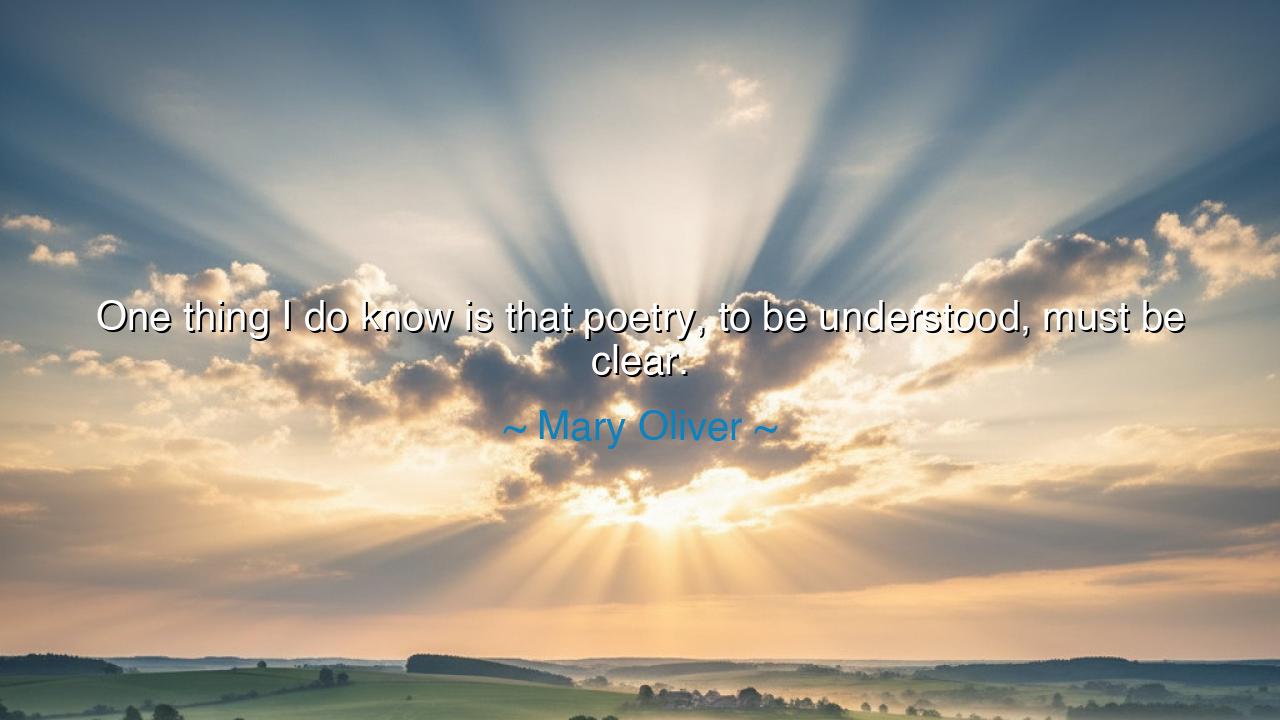
One thing I do know is that poetry, to be understood, must be






"One thing I do know is that poetry, to be understood, must be clear." Thus spoke Mary Oliver, the poet of nature and simplicity, whose words carried the freshness of rivers and the quiet wisdom of fields. In her declaration, she reminds us that poetry is not meant to be a labyrinth for the mind, but a doorway for the heart. Clarity is not weakness, nor is it simplification—it is the straight path by which the reader may walk into the realm of meaning. For what use is poetry that hides behind obscurity, if it cannot touch the soul of those who seek it?
The ancients themselves often upheld this principle. Did not Homer sing in verses that even the common farmer could understand, though gods and heroes filled his song? The Psalms, too, are direct and luminous, their clarity making them endure for thousands of years. When wisdom is shrouded too heavily in riddles, it risks perishing with the age that birthed it. But when it is clear, it shines across generations, as the sun shines equally upon kings and beggars.
History offers examples of this truth. Consider Walt Whitman, who spoke in a voice plain yet majestic, writing of the body, the land, the people. His poems are vast, but their clarity draws in even those who are untrained in poetry. He sought not to impress, but to embrace. Likewise, Robert Frost wrote of woods, fences, and roads—ordinary images, clear as morning light—yet within them lay depths of human choice, longing, and truth. The clarity of their words did not diminish their power; it magnified it.
Mary Oliver herself lived this lesson. Her poetry spoke of wild geese, of lilies, of the briefness of human life set against the eternity of the natural world. Some critics dismissed her work as "too simple," yet millions of readers found solace and strength in it. She proved that clarity is not the enemy of depth, but its vessel. A simple image, when true, carries more weight than a hundred obscure abstractions. Oliver’s poetry endures because it is clear enough to be entered, but deep enough to be lived.
The wisdom here is not that poetry must be stripped of mystery, but that its mystery must be accessible. The stars are mysterious, but they are also visible to all. So too should poetry carry its meaning in words that open rather than close, that invite rather than exclude. The poet who writes only to be admired by scholars builds a tower that few can climb. The poet who writes with clarity builds a home where all can enter, and in that home, the deepest mysteries may be encountered.
The lesson for us is both practical and spiritual: when you speak, write, or create, do not seek obscurity for its own sake. Let your words shine with clarity, so that others may share in the truth you have discovered. This does not mean forsaking depth, but rather shaping it into forms that can be grasped. Clarity is generosity; obscurity is pride. Choose generosity.
Practically, this means testing your words: do they invite or repel? Do they illuminate or confuse? When you speak, write with honesty and simplicity. When you create, ask if your message can be felt by both the scholar and the child. For in such clarity lies the true power of art: the ability to bridge the many with the one, the complex with the simple, the heart of the poet with the heart of the world.
So remember, children of tomorrow: "poetry, to be understood, must be clear." Do not mistake obscurity for greatness, nor complexity for wisdom. The truest words are those that shine plainly, carrying within them the strength of mountains and the tenderness of rivers. Let your words be clear, and through that clarity, let your truth endure.






PLNguyen phuong linh
I find it interesting that Oliver emphasizes clarity as essential for understanding poetry. In a way, this challenges the notion that poetry should be enigmatic or obscure. Can a poem be both clear and deeply moving, or does clarity sometimes sacrifice emotional complexity? How does a poet walk the fine line between making their work accessible while still capturing the richness and complexity of life?
MTMinh thu
Oliver’s quote makes me reflect on what makes poetry truly effective. Clarity in poetry seems to imply that the poem’s message or emotion should be easily accessible to the reader. But is there a risk of oversimplifying the message to the point that it loses its depth? How do we ensure that poems remain clear without losing the nuances and layers that make them memorable and moving?
NTNguyen Tay
I love the idea that poetry must be clear to be understood. It raises an interesting point—does this mean that complexity should always be stripped away? Is clarity in poetry about accessibility, or is it about creating a more direct emotional connection with the reader? Sometimes I feel that the beauty of poetry lies in its ambiguity, so how do we find the right balance between clarity and mystery?
TTPham thanh tien
Mary Oliver’s quote really makes me think about the balance between clarity and artistic depth in poetry. Can poetry be both clear and profound, or do the two qualities sometimes conflict? I find myself wondering—should poetry always be easily understood, or is there value in obscurity and complexity? Does a poem lose its power if it’s too clear, or does clarity enhance its impact by making the message more accessible?